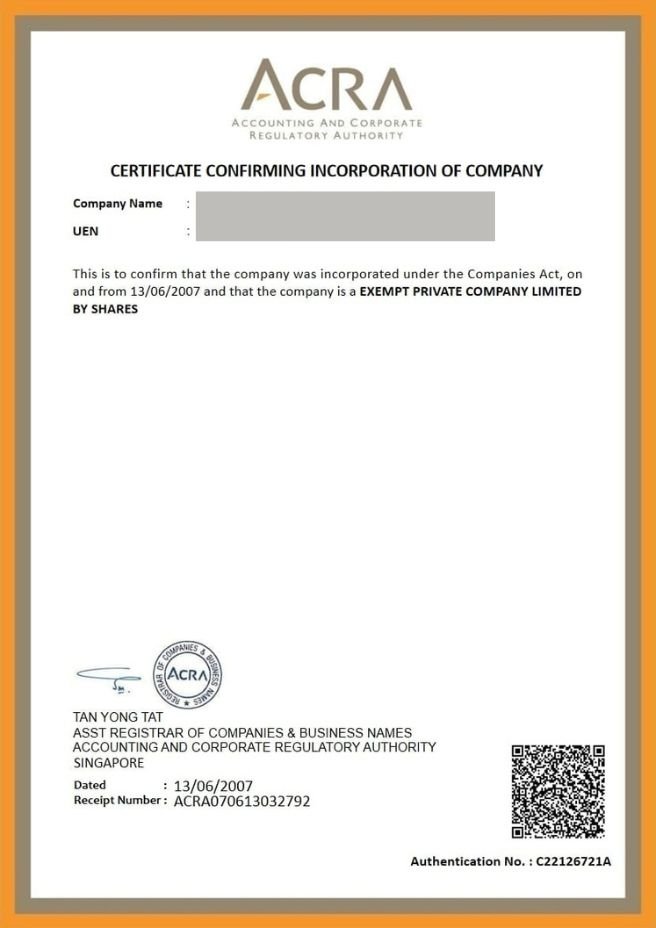In general, a company is a legal entity that is distinct from the shareholders and directors of it. A company can be a business entity that engages in contracts, owns property, and employs employees. As a result, the company, not the shareholders, is liable for the company’s debts. We will discuss throughout this article the various options available to you for setting up a Singapore company, as well as how you can establish your own company. There are primarily two types of companies: public and private.
A public company is listed on the Singapore Stock Exchange and has at least 50 shareholders. A private company is not listed and has no more than 50 shareholders. Shareholders elect directors to oversee the company’s operations. In Singapore, you can incorporate a company if you are over the age of 18, whether you are a local or a foreigner. Foreigners need to complete your company registration to be eligible for an employment pass with guaranteed approval from authorities.
Setting up a Singapore company: why should you do it?
Company shareholders have limited liability, unlike sole proprietors and partnerships. Companies are separate legal entities from their owners, so owners/shareholders are not personally liable for debts or legal actions against the company. It is possible for owners or shareholders of a company to be held liable for the company’s debts if they have committed fraud, for example.
There are more legal requirements to comply with in companies than in individuals. The Accounting and Corporate Regulatory Authority (ACRA) imposes penalties for failing to file annual returns, as well as for failing to hold annual general meetings. Additionally, winding up a company requires additional work. Removing a company from the company register may take up to five months.
In order to grow your company, a company structure is the most effective option, since it makes raising capital and transferring ownership of the company easier. You can read more about the different business models in Singapore here and also read up on the business structure in Singapore.

Before registering a Singapore company, you should know the following:
Directors
A Singapore company must appoint at least one director whose residence is in Singapore. Singapore citizens, Singapore Permanent Residents, EntrePass holders, Employment Pass holders, and Dependent’s Pass holders meet the requirement of residing in Singapore by definition. The company can appoint as many local or foreign directors as it wishes. A director must be at least 18 years old, not bankrupt, and have no previous criminal convictions. There is no requirement that a director be a shareholder, and vice versa.
Shareholders
A private company in Singapore must have at least one shareholder, and no more than 50 shareholders. Shareholders can be either natural persons (individuals) or legal entities (a company or trust). A Singapore company can be 100% local or foreign owned. The company can also issue new shares after it is incorporated or transfer existing shares.
Corporate secretary
As a result of the Company Act, all companies must appoint a qualified corporate secretary within six months of incorporation. The corporate secretary must reside in Singapore, similar to directors. There is an important note that when there is only one shareholder/director, that person is not permitted to serve as the corporate secretary.
Paid-up capital
The minimum paid-up capital to incorporate is S$1. This is because the company will need some money to start its operations. After the company is incorporated, it can increase its paid-up share capital anytime to support its growth.
A registered address
New companies are required to use Singapore addresses as their registered addresses. The address can be either a commercial or residential address as long as it is a physical address rather than a P.O. box. The Home Office Scheme, for example, permits Singaporeans to use their home address as the registered address of their businesses. The same scheme is also applicable to private properties.
Owners/occupiers should check their eligibility and obtain HDB approval. Private residential property owners are required to obtain urban redevelopment authority approval. Most importantly, the registered office in Singapore must be accessible and open during normal business hours.
Company Tax
Singapore’s corporate tax rate is 17%. In addition to that, Singapore companies benefit from highly attractive tax incentives and exemptions. An newly incorporated company will receive tax exemptions for the first S$200,000 of chargeable income. Singapore registered companies will not be taxed on capital gains or dividends. The accounting firms that I work with will be able to provide you with further information regarding corporate tax matters in Singapore.
Documents Required
The following information is required by ACRA for the incorporation of a company:
- Select a company name approved by ACRA
- A description of the activities of the company
- Shareholders’ details
- Director’s details
- Address of company registration
- Corporate secretary’s details
- Constitution of the company
- The company’s proposed fiscal year-end date
Incoporation
Registration of a company in Singapore is done online. The incorporation process usually takes one to two days. Fortunately, if you reside outside Singapore, you don’t need to be present to do so. Nevertheless, it is advisable that you engage the services of a Corporate Secretary to help you with the process.
1. Choosing an approved name and address
In order to incorporate a company in Singapore, you must first choose an approved name from ACRA.
It normally takes one hour or less for incorporation to be completed. However, if the proposed company name contains sensitive words, approval may take up to a few days.
Ensure that the proposed company name:
- The name of the company is not the same as that of any existing Singapore company
- There is no infringement of any trademarks
- No vulgarity or offensive language
- It is not under reservation
You can reserve a company name for up to 60 days after submitting the application. If necessary, an extension can be applied for before the expiration date for another 60 days.
2. Adopting company’s constitution
In every business, a constitution is required. This is a legal document that outlines the rules and regulations that govern the way the company is run, the structure of the company, shareholder rights, and all other rules and regulations pertaining to its management.
In order to avoid hefty legal fees, engage a Corporate Secretary services and he/ she should have a model constitution as a starting point.
3. Completion of registration
You need to provide key information in order to finalize your registration. This includes information about the company’s shareholders, directors, and officers.
Shareholder Agreement
It is important to have a shareholder agreement for incorporation as well as the company constitution because it sets the rules and regulations for managing the company.
Furthermore, it defines the relationship between all parties, including shareholders and directors. In addition to covering specific situations, shareholder agreements also serve to resolve any disputes that may arise. Additionally, they serve to supplement the company’s constitution.
Documents issued after registration
Upon successful incorporation, ACRA will send you the following documents:
1. Certificate of Incorporation
An official email confirmation of incorporation will be sent from ACRA after the successful incorporation, containing the unique entity number (UEN) and serving as the official certificate of incorporation. Hard copies of the certificate are no longer issued by ACRA because they are no longer required. A request for a hard copy can be made online for a fee.

2. Business profile
After successful registration, you can download your business profile within an hour, which contains the following information:
- The company name and the UEN
- The previous names of the company (if any)
- Date of incorporation
- Principal business activities
- The paid-up share capital
- Registered address
- Shareholders’ particulars
- Directors’ particulars
- Company secretary’s particulars
These two documents (Certificate of Incorporation, Business Profile) are sufficient in Singapore for all contractual and legal purposes. In order to open corporate bank accounts, sign a lease for a rental property, and subscribe to Internet services, these documents are required.
Maintenance fees of a company
It should be noted that after you register your company, you will have to pay certain fees on an annual basis to ensure compliance with the authorities. Do note, any late filing or compliance omissions can result in fines and penalties. For example, if a company does not file its annual returns on time, it will be fined $300. A company and its directors can be fined up to S$5,000 for failing to hold an AGM in accordance with section 175 of the Companies Act.
Finally, after incorporating a company, the next is to search for a suitable office space to meet your business needs.
Finally, after incorporating a company, the next is to search for a suitable office space to meet your business needs.
As a real estate agent, I am committed to helping my clients find the perfect office space to meet their needs. My services include:
Identifying suitable properties: I will work with you to understand your specific requirements for an office space, including size, location, and budget. I will then use my knowledge of the local real estate market to identify properties that meet your criteria.
Arranging viewings: Once we have identified potential properties, I will arrange viewings so that you can see the spaces in person and get a feel for the layout and amenities.
Negotiating the best deal: Once you have found the perfect office space, I will negotiate on your behalf to get the best possible price and terms for the lease.
Handling the paperwork: I will take care of all the necessary paperwork to ensure a smooth and stress-free transition into your new office space.
I am dedicated to providing exceptional service and support to my clients throughout the entire process of finding an office space. If you are in need of a reliable and knowledgeable real estate agent, please do not hesitate to contact me.
You may also read up on 4 Points to Consider When Renting an Office in Singapore in my other article.















